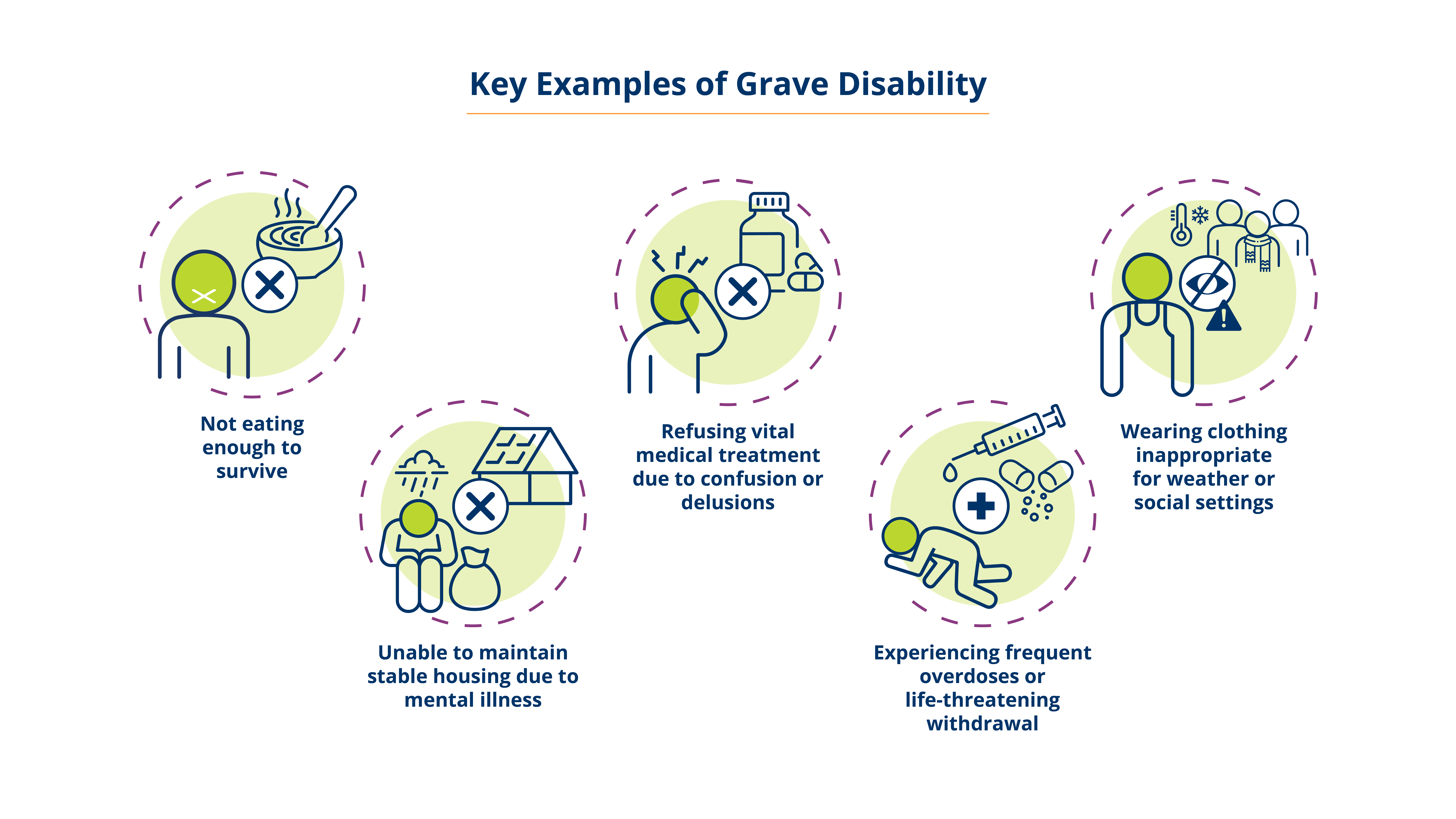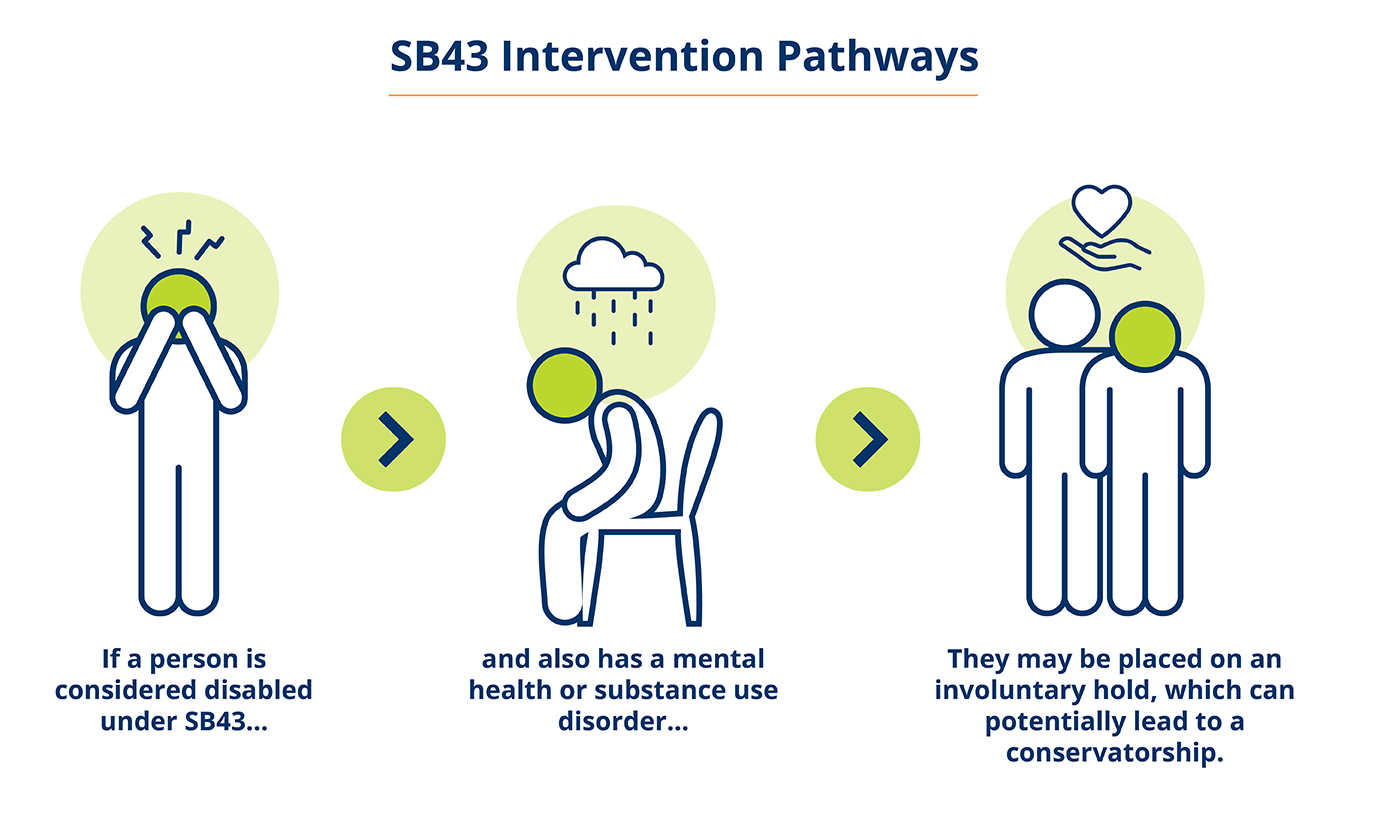Overview
Senate Bill 43 (SB 43), signed into law in October 2023, modernizes California's Lanterman-Petris-Short (LPS) Act, expanding criteria for involuntary mental health and substance use interventions. Riverside County will fully implement SB 43 on January 1, 2026, to better support individuals facing serious behavioral health challenges.
Need Immediate Help?
Behavioral health crisis support is available 24/7:
- CARES Line: (800) 499-3008
- Crisis HELP Line: (951) 686-HELP (4357)
Questions about SB 43?
Contact our Behavioral Health Office:
(951) 743-9451
What Does SB 43 Change?
SB 43 broadens the definition of grave disability to help individuals who cannot recognize their need for care.
| Previous Definition | New Definition (Effective Jan 1, 2026) |
|---|---|
| Unable to provide food, clothing, or shelter due to mental health disorder. | Unable to provide for food, clothing, shelter, personal safety, or essential medical care due to mental health or severe substance use disorder. |

New Qualifying Conditions:
- Serious risks to health or safety (e.g., repeated overdoses, severe withdrawal)
- Inability to access essential medical care (e.g., untreated infections, chronic illness)
- Behavioral health conditions preventing basic daily living
Key Examples:
- Food icon Severe malnutrition or not eating
- Home icon Losing housing due to untreated mental illness
- Pills icon Refusing vital treatment because of delusions
- Warning icon Frequent overdoses or life-threatening withdrawals
- Brain icon Lack of awareness about personal danger
How SB 43 Works: The Intervention Process
California's Welfare and Institutions Code outlines intervention steps:
WIC 5150
Up to 72 hours of immediate crisis evaluation
WIC 5250
Up to 14 days of further stabilization
WIC 5270.15
New in Riverside (Sept 2024) — Up to 30 days for extended recovery planning
WIC 5350
LPS Conservatorship — 6 months to 1 year of coordinated care for those requiring ongoing support

Protecting Individual Rights
Under SB 43, dignity and rights remain central:
- Right to a legal hearing before extended treatment
- Access to advocacy and representation
- Regular reviews to ensure the least restrictive care
- Riese Hearings to protect medication decision rights (except in emergencies)
SB 43 and Youth
SB 43 only applies to adults. Involuntary care for minors (under 18) is governed by WIC 5585.25.
- WIC 5585.50 allows a 72-hour hold for youth in crisis.
- Parents, schools, and providers work collaboratively to ensure compassionate care for minors.
If you're seeking help for a young person, specialized resources and protections are available.
Frequently Asked Questions (FAQ)
Can SB 43 help with severe substance use issues?
Yes — substance use alone can now qualify if it seriously endangers health or safety.
Will my loved one be forced into treatment?
No. SB 43 is used only when someone cannot recognize the need for lifesaving care.
What happens after an involuntary hold?
An initial 5150 may lead to further care (5250 or 5270.15) with legal safeguards in place.
Will my loved one go to jail?
No. SB 43 prioritizes healthcare, not incarceration.
Can individuals refuse medication?
Yes, unless a judge determines otherwise during a Riese Hearing or in emergencies.
Is treatment available regardless of ability to pay?
Yes. Services are accessible to everyone, regardless of financial situation.
Resources: Watch, Listen, Download
Informational Video
Watch a short overview of SB 43 and what it means for Riverside County residents.
Download the SB 43 Flyer
Our printable flyer summarizes the key changes and legal protections under SB 43.
Listen to the SB 43 Podcast
This special conversation explains how SB 43 will be implemented and what it means for families.
Need Immediate Help?
Behavioral health crisis support is available 24/7:
CARES Line
Crisis HELP Line
Questions about SB 43?
Contact our Behavioral Health Office at (951) 743-9451
